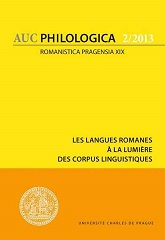Un essai d’ analyse morpho-lexicale: Frantext et les déverbaux espoir/espérance en diachronie
Frantext and the French Deverbal Nouns Espoir/Espérance in Diachrony – An Outline of Morpho-lexical Analysis
Author(s): Jaroslav ŠtichauerSubject(s): Language and Literature Studies
Published by: Univerzita Karlova v Praze, Nakladatelství Karolinum
Keywords: corpus; deverbal noun; suffixation; diachrony; lexical morphology; preclassical and classical French
Summary/Abstract: Starting from the now classic study by Gossen (1955) on the development of French derivational doublet espoir/espérance, the paper aims at revisiting this matter taking advantage of corpus data provided by Frantext, more particularly for the preclassical and classical period. It first observes that this pair of deverbal nouns departs from both similar formations and the development of deverbals suffixed in -ance. It then analyzes a number of constructions in order to highlight potential differences in the semantic interpretations and syntactic use of these near-synonyms. The corpus data tend to show that the prediction about, i.a., the stronger processive character of deverbal in -ance (espérance) is not fully borne out and that corpus-based quantitative analysis proves unable, in this very case, to shed fundamentally new light on Gossen’ s conclusions.
Journal: Acta Universitatis Carolinae Philologica
- Issue Year: 2013
- Issue No: 2
- Page Range: 45-53
- Page Count: 9
- Language: French

